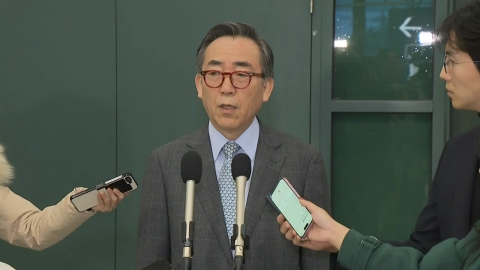Fatal malformations and preterm birth...Children whose lives are threatened by the abnormal climate.
In June 2022, 62 infants and toddlers, including fetuses, filed a constitutional petition for the first time in the world.
The so-called 'Baby Climate Litigation Group'
"I want to run around in a world that's not hot."
stood in front of the Constitutional Court directly by gathering his hands with one small wish.
Some people say this.
What does a child know, it's just a show of adults with children at the forefront.
Is that really the case?
According to a recently published paper, the higher the temperature, the higher the risk of premature birth in pregnant women.
Wildfires and air pollution caused by climate change have created serious birth defects and reduced fertility rates.
It's not a show.
Even unborn fetuses, infants and children, were truly victims.
Arctic sea ice melted and the desert became a sea of water.
On one side, there is a flood, but on the other side, there is a severe drought.
As the earth heats up, the atmosphere becomes drier and wildfires become more frequent.
A disaster created by the era of global warming beyond global warming.
The shadow of an abnormal climate was cast over the ecosystem as well as over the heads of humans.
It even threatens the unborn fetus in the womb.
Researchers at the Albany Campus School of Health at New York State University recently published a paper on the effects of heat waves on fetuses.
If a mother is exposed to high temperatures in the early stages of pregnancy, the number of newborns born with "natural heart defects" increases.
It was recommended that heat waves should be avoided between three and eight weeks of pregnancy for the health of the fetus.High temperature
also affects preterm birth.
According to a paper published in 2022, the risk of premature birth was 16% higher for pregnant women exposed to the top 5% high temperatures than for those who did not.
The case of pregnant women living in countries vulnerable to the climate crisis was worse.
According to the London School of Hygiene and Tropical Medicine and the Gambia Medical Research Team, a 1 degree increase in the heat stress level of a pregnant woman increased the stress of the fetus by 17%, and a step higher in the heat stress of a pregnant woman increased the stress of the fetus by as much as 20%.
This eventually leads to an increase in the fetus' heart rate and a decrease in blood flow, causing stillbirth and premature birth.
The ozone layer destroyed by global warming is also a problem.
According to the Environmental Health Center of Seoul Medical School, every 0.018 ppm increase in atmospheric ozone concentration increases the incidence of congenital malformations in fetuses.
In the middle of pregnancy, the incidence of circulatory system congenital disease in fetuses increased by 5.0%, the musculoskeletal system increased by 7.1%, and the urinary system increased by 11.7%.
Air pollution is also a must.
A study found that exposure to wildfires in the early stages of pregnancy increases the risk of "abdominal wall rupture" in the fetus by 28%.
Surprisingly, exposure to wildfires within 30 days of pregnancy doubled the risk.
So what about children?
The risk of obesity in children exposed to high temperatures in the top 20% was 5% higher than otherwise.
Continuous heat waves and heat stress have reduced children's academic achievement by up to 7% and greatly increased the incidence of ADHD.
Children whose lives are threatened even before birth, even though they are not responsible for anything.
Children have spoken out to solve the climate crisis homework that adults have delayed.
And on August 29, after four years and five months, the answer came out.
The Constitutional Court has decided that the "carbon neutrality law" is inconsistent with the constitution.
Although the result was 'partial winning', it was a meaningful ruling recognizing the seriousness of the climate crisis.
Ms. Han Je-ah of the Baby Climate Litigation Group says.
"Adults call us future generations, but everyone wants to live tomorrow and live a minute later. Aren't they all future generations?"
Article 35 of the
Constitution says.
"All citizens shall have the right to live in a healthy and pleasant environment, and the State and the people shall endeavor to preserve the environment."
Before it's too late, it's time for us to keep our word.
The so-called 'Baby Climate Litigation Group'
"I want to run around in a world that's not hot."
stood in front of the Constitutional Court directly by gathering his hands with one small wish.
Some people say this.
What does a child know, it's just a show of adults with children at the forefront.
Is that really the case?
According to a recently published paper, the higher the temperature, the higher the risk of premature birth in pregnant women.
Wildfires and air pollution caused by climate change have created serious birth defects and reduced fertility rates.
It's not a show.
Even unborn fetuses, infants and children, were truly victims.
Arctic sea ice melted and the desert became a sea of water.
On one side, there is a flood, but on the other side, there is a severe drought.
As the earth heats up, the atmosphere becomes drier and wildfires become more frequent.
A disaster created by the era of global warming beyond global warming.
The shadow of an abnormal climate was cast over the ecosystem as well as over the heads of humans.
It even threatens the unborn fetus in the womb.
Researchers at the Albany Campus School of Health at New York State University recently published a paper on the effects of heat waves on fetuses.
If a mother is exposed to high temperatures in the early stages of pregnancy, the number of newborns born with "natural heart defects" increases.
It was recommended that heat waves should be avoided between three and eight weeks of pregnancy for the health of the fetus.High temperature
also affects preterm birth.
According to a paper published in 2022, the risk of premature birth was 16% higher for pregnant women exposed to the top 5% high temperatures than for those who did not.
The case of pregnant women living in countries vulnerable to the climate crisis was worse.
According to the London School of Hygiene and Tropical Medicine and the Gambia Medical Research Team, a 1 degree increase in the heat stress level of a pregnant woman increased the stress of the fetus by 17%, and a step higher in the heat stress of a pregnant woman increased the stress of the fetus by as much as 20%.
This eventually leads to an increase in the fetus' heart rate and a decrease in blood flow, causing stillbirth and premature birth.
The ozone layer destroyed by global warming is also a problem.
According to the Environmental Health Center of Seoul Medical School, every 0.018 ppm increase in atmospheric ozone concentration increases the incidence of congenital malformations in fetuses.
In the middle of pregnancy, the incidence of circulatory system congenital disease in fetuses increased by 5.0%, the musculoskeletal system increased by 7.1%, and the urinary system increased by 11.7%.
Air pollution is also a must.
A study found that exposure to wildfires in the early stages of pregnancy increases the risk of "abdominal wall rupture" in the fetus by 28%.
Surprisingly, exposure to wildfires within 30 days of pregnancy doubled the risk.
So what about children?
The risk of obesity in children exposed to high temperatures in the top 20% was 5% higher than otherwise.
Continuous heat waves and heat stress have reduced children's academic achievement by up to 7% and greatly increased the incidence of ADHD.
Children whose lives are threatened even before birth, even though they are not responsible for anything.
Children have spoken out to solve the climate crisis homework that adults have delayed.
And on August 29, after four years and five months, the answer came out.
The Constitutional Court has decided that the "carbon neutrality law" is inconsistent with the constitution.
Although the result was 'partial winning', it was a meaningful ruling recognizing the seriousness of the climate crisis.
Ms. Han Je-ah of the Baby Climate Litigation Group says.
"Adults call us future generations, but everyone wants to live tomorrow and live a minute later. Aren't they all future generations?"
Article 35 of the
Constitution says.
"All citizens shall have the right to live in a healthy and pleasant environment, and the State and the people shall endeavor to preserve the environment."
Before it's too late, it's time for us to keep our word.
[Copyright holder (c) YTN Unauthorized reproduction, redistribution and use of AI data prohibited]
Editor's Recomended News
The Lastest News
-
Hezbollah, Leader Nasrallah Open Funeral Only After Ceasefire
-
Israel strikes school in Gaza refugee camp...Eleven people died, including children.
-
"The most popular national technical qualification in the recruitment market last year was a forklift driver."
-
Electric shock in their 40s while checking electrical safety at the bank...a full-body third-degree burn
Entertainment
Game
-
Netmarble will officially release its new RPG 'King Arthur: Legend Rise' on the 27th.

-
Game Culture Foundation verifies the effectiveness of the game and immersion youth healing program...scheduled to be distributed nationwide early next year

-
Who is your star? 2024 E-Sports Hall of Fame induction ceremony fan voting begins





![[Focus Y] Can the](https://image.ytn.co.kr/general/jpg/2024/1127/202411271804218526_h.jpg)

![[On site Y]](https://image.ytn.co.kr/general/jpg/2024/1127/202411271729128587_h.jpg)